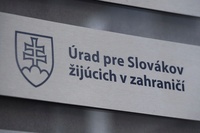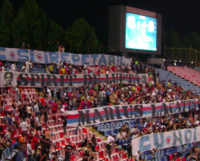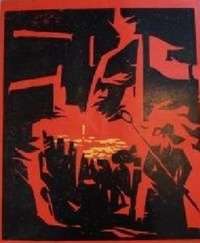Na današnji dan

- Posts : 7899
Join date : 2019-06-06
- Post n°326
 Re: Na današnji dan
Re: Na današnji dan
od moje neke pradavne devojke, majka je predavala marksizam, u srednjoj skoli. Mislim da se posle prebacila na sociologiju, uz neku razliku u ispitima.
_____
????

- Guest
- Post n°327
 Re: Na današnji dan
Re: Na današnji dan
beatakeshi wrote:Zatiranje, do onog čikice na semaforu.
To je Ampelmann
I then took a risk and asked him if he believed that Ampelmann was one
of the few contributions the GDR was allowed to make to unified Germany.
He laughed and said, “Yes, Ampelmann and not much more, perhaps
nothing more.”
The Ampelmann illustration came up frequently among these former
East Germans as we spoke of the refusal of the West Germans to consider
the GDR’s potential contributions to unified Germany.
Oko marksizma/društvenih nauka, nije nezanimljivo:
http://93.174.95.29/main/1676000/8f4ee4e23615f55deb86089582008cd6/Dan%20Bednarz%20%28auth.%29%20-%20East%20German%20Intellectuals%20and%20the%20Unification%20of%20Germany_%20An%20Ethnographic%20View-Palgrave%20Macmillan%20%282017%29.pdfThe realpolitik of German unification was that the FRG had taken over
the GDR and then gone about dismantling the latter’s institutions. Given
this situation, there was every reason—sociologically—for the West
Germans to “abwickeln” the cultural, artistic, and knowledge-producing
institutions of the GDR.
Indeed, not one of the many members of the Academy with whom I spoke
uttered anything approximating a sense of being “set free” by the closure of
the Academy. Ironically, they did feel “superfluous” to the West Germans
scientists and academics who had been sent to evaluate them. In their view,
these panels did not evaluate their work and instead functioned as the official
basis for the termination of two-thirds of the Academy’s employees.
Approximately one-third of the Academy’s scientists and scholars were
offered positions, typically two-year contracts, at universities or research
institutes.
...
Another person I re-interviewed, a historian from the Academy who was
able to continue on in his career, pointedly said to me, “As you are a
sociologist interested in our collective identity, let me be clear: The
Abwicklung is not an interpretation or social construction of reality. It is a
matter of fact that the West Germans took over the GDR. This is not open
to discussion; it is what happened. For instance, as the Academy came to its
end as part of the terms in the unification treaty, our workgroups were
broken up. This dismissal of many of those at my institute and the scattering
of others to various institutes was detrimental for our intellectual careers. To
our regret, we were all treated as individuals by the Wissenschaftsrat process—
some kindly, many unfairly and rudely.”
“It is most important to point out that we from the East were socialized
to do research collaboratively in groups. . . When this work sharing arrangement
we had at the Academy came to an end, those of us who received
contracts had to adapt quickly to the Western model of the individual
competitive scientist.”
“I personally cannot complain because I was offered a good position in a
West Berlin institute and accorded respect and intellectual freedom by my
supervisors and colleagues. My supervisor said to me, ‘Please carry on the
research you were doing.’”
“Some of my work from GDR times was well regarded among the West
Germans and I’m not an abrasive person—this was critical, I think, to my
survival. However, many good people I know were not as fortunate as I
have been. The important point, to say it again, is that the GDR was
brought to an end as a matter of policy. A relatively small number of
individual academics and scientists were folded into, and even welcomed
into, the West Germany system.”
“By the way, I believe that the workers suffered greater economic hardships
and displacements than did the intellectual class. I’m sure you know
about the massive industrial and manufacturing plant closings, the
Treuhand’s activities, and the resultant high unemployment rates which
persist to this day.”
...
I asked everyone at some point in these 2014 interviews, “Do you know
how many were dismissed from the Academy and the GDR universities?”
Here is a summary of their responses.
None knew of any studies or data sources amenable to investigating this
question of what happened to those two-thirds working at the Academy
who were dismissed, those let go from East German universities, and various
GDR media institutions such as radio, television, and print. They all
reported with certainty that about one-third of those working at The
Academy of Sciences were offered contracts in 1991 or shortly thereafter
to carry on their careers in West German institutions. The remaining
two-thirds were left with what in their eyes were second- and third-choice
options. One was to enter into ABM (Arbeitsmaßnahmen), a program for
the unemployed; another was to enroll in one of the so-called integration
programs, where the loosely conceived idea was to allow GDR scholars,
academics, and scientists to apprentice—at low pay and typically low or
ambiguous status—with West German academics for a period of time as a
sort of retraining and acclimation or acculturation program. Others, some
of whom were either highly sought after by colleagues in other nations, or
disgusted at their treatment by West Germans, or faced accusations
of collaboration with the Stasi, emigrated to find work and a new life.
A few took up the daunting challenge of beginning their own businesses.
Some unknown numbers—probably a tiny minority—committed suicide
(most of those I interviewed in July 2014 had a tale of someone who had
taken their life). Still others felt forced into early retirement or denied
scientific or governmental positions because they were formally accused of
moral turpitude for in some manner collaborating with the Stasi. Those with
various technical skills found work in private industry; others, typically those
with good spoken and written German language skills and deft at logical
thinking and social interaction, found work in business offices as low-level
managers or sold insurance.13 And some drove taxicabs to earn a living.
A historian who was positively evaluated by the Wissenschaftsrat that
reviewed his Academy institute reported, “I felt treated fairly by the
Wissenschaftsrat, but disadvantaged when I had to compete for academic
positions. A central reason was that I was in competition with the
oversupply of West German PhDs from the FRG. East Germany presented
an unprecedented opportunity for this oversupply of West Germans to
receive positions in former GDR universities and become full professors—
or at least receive full academic appointments. They would then establish
their careers here in the East and attempt to return to a more prestigious
university in the original FRG states.”
“It was a very uneven process and it is difficult to generalize for you
except to say that we East Germans were typically discriminated against in
our pursuit of career opportunities.”
“Can you give me some examples or criteria of this discrimination?” I
asked him.
“Well, a critical factor is that we, GDR academics, had no social networks
and, therefore, no power to access these positions. The West Germans of
course had the networks and, therefore, the power to control to a great
extent who would receive these jobs. For instance, if a professor supervises a
student’s doctoral studies he, this professor, has an interest regarding his
prestige in seeing to it that the student finds a good academic position. To
illustrate, I was for a time at Bielefeld [University] and I can assure you that
it was unthinkable that an East German could rise to a full professorship.
The general attitude there was that we East Germans were ‘rural’ and more
or less primitive. This was subtle, not openly displayed and not all West
German academics shared this view—some did not know they held it. They
just exhibited it in their expressions and conduct.”
“Nonetheless, I count myself as one of the fortunate ones who was able
to have an academic career after the Academy was closed. In this moment,
however, looking back, in some ways it might have been better if I had
simply been dismissed like so many of my colleagues at the Academy. It has
been a very hard twenty plus years in the FRG academic system.”
A sociologist recounted her institute's unpleasant treatment when visited
by the Wissenschaftsrat evaluation panel as if this incident had occurred
recently rather than twenty-four years in the past.
“I was a practicing sociologist, and still this panel treated me as if I was a
naïve or somewhat ignorant schoolgirl, asking questions as if I did not know
the basic principles of sociology. They also showed no collegiality towards
my fellow Academy colleagues. It was all top-down, ‘We West German
sociologists know and you East Germans do not know’—that type of
situation. And then, to my surprise, they gave several of us a positive
evaluation and I was given a contract to come to this university, where
I’ve survived numerous contract renewals over the past two decades.”
The academic couple mentioned above gave this account of their adaptation
to the German capitalist economy, “The Turn arrived when we were
mature professionals [in their thirties], and we both set out to re-orient
ourselves to the new economic reality. In the GDR we had received strong
technical training, and an education grounded in systems thinking, which
we felt encouraged independent thought and action. . . On the other hand,
. . . we had limitations: . . . insufficient Western European language skills,
and a lack of . . . personal computer skills and knowledge of how to engage
in what we call self-marketing.”
“We felt professionally on a par [with West Germans] and were generally
treated well by western colleagues. . . We observed and experienced first
hand that [East Germans] could find employment on the basis of sound
scientific-technical, medical or linguistic skills. However, it would be in a
low-paying entry-level position, even if you had many years of professional
experience.”
“Interestingly, we also met West Berlin or West German colleagues who
felt disadvantaged because of . . . the sudden . . . flood of technically and
otherwise competent East Germans who could be hired at low wages.”


- Posts : 52649
Join date : 2017-11-16
- Post n°328
 Re: Na današnji dan
Re: Na današnji dan
Jbg, jeste bio "hladni" rat. Ali i hladni rat je nekakav rat...

- Guest
- Post n°329
 Re: Na današnji dan
Re: Na današnji dan
Janko Suvar wrote:od moje neke pradavne devojke, majka je predavala marksizam, u srednjoj skoli. Mislim da se posle prebacila na sociologiju, uz neku razliku u ispitima.
meni je marksizam predavao zoran avramović
samo jedan u nizu apsurda sa kojima sam bio suočen tokom detinjstva, dečaštva i mladosti, što reče tolstoj

- Posts : 52649
Join date : 2017-11-16
- Post n°330
 Re: Na današnji dan
Re: Na današnji dan
posle je postao obožavalac Crnjanskog...tako da sve se slaže

- Guest
- Post n°331
 Re: Na današnji dan
Re: Na današnji dan
U Rusiji je marksizam prešaltovan u "kulturologiju" tokom 90ih, a delovi tog akademskog kadra su se posle prešaltali na "geopolitiku".

- Posts : 52649
Join date : 2017-11-16
- Post n°332
 Re: Na današnji dan
Re: Na današnji dan
Bendegúz Somogyi wrote:U Rusiji je marksizam prešaltovan u "kulturologiju" tokom 90ih, a delovi tog akademskog kadra su se posle prešaltali na "geopolitiku".
dobro, to je još gore

ali je jednako prirodno, pogotovu za Rusiju. Mislim, nije verovatno direktno vezano, ali ruska geopolitika je u velikoj meri sovjetska, pričali smo o tome


- Guest
- Post n°333
 Re: Na današnji dan
Re: Na današnji dan
Da, s tim da je kod njih to baš imalo i dobar zamah birokratizma: "dajmo im nešto da rade u novim okolnostima". I ovi uzeli da rade, adaptirali se na tržištu rada, stekli nove skilove i počeli da produkuju 1 geopolitiku ofarbanu u evroazijanizam.
Karikiram, ali ne previše.
Karikiram, ali ne previše.

- Posts : 28265
Join date : 2015-03-20
- Post n°334
 Re: Na današnji dan
Re: Na današnji dan
Talason wrote:
meni je marksizam predavao zoran avramović
samo jedan u nizu apsurda sa kojima sam bio suočen tokom detinjstva, dečaštva i mladosti, što reče tolstoj
ja sam služio vojsku sa mirkom puzovićem.
svakom svoje.
_____
#FreeFacu
Дакле, волео бих да се ЈСД Партизан угаси, али не и да сви (или било који) гробар умре.

- Posts : 41722
Join date : 2012-02-12
Location : wife privilege
- Post n°335
 Re: Na današnji dan
Re: Na današnji dan
Mór Thököly wrote:posle je postao obožavalac Crnjanskog...tako da sve se slaže
Ко, Толстој? :љ
_____
the more you drink, the W.C.
И кажем себи у сну, еј бре коњу па ти ни немаш озвучење, имаш оне две кутијице око монитора, видећеш кад се пробудиш...

- Guest
- Post n°336
 Re: Na današnji dan
Re: Na današnji dan
A day of historic battles. Many Serbs
— Carl Bildt (@carlbildt) June 28, 2020are still agitated over their loss in the Kosovo battle, but you would be hard pressed to find any Swede
who really cares about the loss at Poltava more than three hundred years later. pic.twitter.com/6FqDYR03Mo

- Posts : 7899
Join date : 2019-06-06
- Post n°337
 Re: Na današnji dan
Re: Na današnji dan
samo su ovi sto mu objasnjavaju veci retardi od njega
_____
????

- Posts : 7899
Join date : 2019-06-06
- Post n°341
 Re: Na današnji dan
Re: Na današnji dan
pa reci jeboga ti  mozes reci ako mislis da mi je glupa ova provokacija, mnogo je mrtva atmosfera na forumu, svbako moze da kaze sta oce, nema nikakvog vredjanja.
mozes reci ako mislis da mi je glupa ova provokacija, mnogo je mrtva atmosfera na forumu, svbako moze da kaze sta oce, nema nikakvog vredjanja.
 mozes reci ako mislis da mi je glupa ova provokacija, mnogo je mrtva atmosfera na forumu, svbako moze da kaze sta oce, nema nikakvog vredjanja.
mozes reci ako mislis da mi je glupa ova provokacija, mnogo je mrtva atmosfera na forumu, svbako moze da kaze sta oce, nema nikakvog vredjanja._____
????

- Posts : 19279
Join date : 2014-12-12
- Post n°342
 Re: Na današnji dan
Re: Na današnji dan
Kako da ti kažem, đukanovićevska (mislim na Bizona).

- Guest
- Post n°343
 Re: Na današnji dan
Re: Na današnji dan
Evo Šuvare, pozdrav od predsednika
buducnostsrbijeav
Vidovdan je jedan od onih praznika, koje smo, tokom istorije, činili velikim, i kada smo gubili i dobijali, i kada smo činili velike i časne stvari, i, mnogo ređe, nečasne.
Потврђени налог
Vidovdan je prerastao mit i postao istorija, naša istorija, teška i previše krvava. Ona koje danas nemamo razloga da se stidimo, naprotiv, ali još manje imamo pravo da koristimo Vidovdan kako bismo obmanjivali buduća pokoljenja.
I ništa bolje, i ništa više, od Vidovdana, ne pokazuje koliko je stvaranje istorije i budućnosti u našim rukama, koliko zavisi od nas i onoga šta, kako i koliko radimo.
Zato je važno da, baš danas, još jednom pokažemo koliko smo spremni da svoju zemlju sačuvamo, odbranimo od svakog zla, i načinimo je velikom, poštovanom, i to na zemlji, a ne samo na nebu. Ubeđen da smo za to sposobni, verujući u Srbiju, u svakog čoveka i ženu u njoj, čestitam vam Vidovdan, naš najvažniji dan, dan koji će postojati dok je Srba i Srbije!

- Posts : 7899
Join date : 2019-06-06
- Post n°344
 Re: Na današnji dan
Re: Na današnji dan
Dubravka Stojanovic da mu vrati sifru od Instagrama
_____
????

- Posts : 7899
Join date : 2019-06-06
- Post n°345
 Re: Na današnji dan
Re: Na današnji dan
vidis izdrzao je moj nezni ego, nisi morao da brines da l cu se uvredim.beatakeshi wrote:Kako da ti kažem, đukanovićevska (mislim na Bizona).
_____
????

- Posts : 7899
Join date : 2019-06-06
- Post n°346
 Re: Na današnji dan
Re: Na današnji dan
beatakeshi wrote:Kako da ti kažem, đukanovićevska (mislim na Bizona).
Importovani koronavirus uzima danak u CG.
— Vlada Crne Gore (@VladaCG) June 28, 2020
Dva pacijenta, koja su bila #COVID-19 pozitivna, preminula su. Za trećeg preminulog pacijenta čeka se rezultat testa.
Upućujemo iskreno saučešće porodicama preminulih. #CoronaInfoCG
(1/2) pic.twitter.com/6pKbDW4cMi
_____
????

- Posts : 8382
Join date : 2014-10-28
Location : imamate of futa djallon
- Post n°347
 Re: Na današnji dan
Re: Na današnji dan
e a sad nesto za tebe da preslusas kinderlade 

Tko je nama Reihl-Kir?
Na današnji dan 1991. godine u Tenji je ubijen Josip Tvrtko Reihl-Kir, tadašnji načelnik osječke policije. Ubijen je jer je htio sprečiti rat. Ubijen je jer dijalogom htio posredovati mir između srpskog i hrvatskog naroda, bez imalo sebičnosti, bez fige u džepu, motiviran mirotvorstvom i uvjeren da se pregovorima te na miran način može razriješiti tinjajući sukob, koji se nakon njegovog brutalnog ubojstva pretvorio u brutalan rat.
Oni koje je njegovo mirotvorstvo smetalo – zato što je imalo ozbiljnije šanse da bude uspješno - dali su nalog za njegovo smaknuće.
I tko je nama danas, 29 godina otkad ga više nema, Reihl-Kir? To pitanje smo prije 10 godina postavili javnosti, kada smo otvorili izložbu „Tko je tebi Reihl-Kir?“ čime smo po prvi put, zajedno s Mirovnim inštitutom iz Ljubljane, Biroom za ljudska prava iz Tuzle i Centrom za kulturnu dekontaminaciju iz Beograda javno htjeli obilježavati sjećanje na heroja na nišanu. Prema riječima autorice izložbe, Tanje Simić Berclaz, izložba je "je način odavanja poštovanja mirovnjaku i čovjeku koji je zaista vjerovao da je potrebniji svojoj zemlji i svojim sugrađanima nego što je njegov život bio potreban njegovoj obitelji."
Zašto i na koji način se ovo ubojstvo dogodilo te kakve su bile posljedice ove smrti na preko dvadeset milijuna ljudi poznato je, ali "ko je bio Josip Tvrtko Reihl-Kir, intimno, i da li je ličio na nas, koji se nismo usudili da svoje živote položimo u odbranu izgubljenog? Šta ga je gonilo? Kakva je vera, kakva je strast za bližnjega, koja (ponekog) čoveka tako žestoko šiba napred, i kad mu nasilna smrt, bez maske, gleda pravo u oči?"
Svojim mirotvorstvom i odlučnim djelovanjem, svim prijetećim preprekama unatoč koje su visile nad njime kao mač nad glavom, zadužio je sve nas. Zadužio nas je da se svojim djelovanjem uvijek borimo za solidarnost, za pravdu, za obespravljene, za mir. Sjećanje na Reihla-Kira nije samo bitno da se sjetimo tog mirotvorca i njegovog djelovanja prije gotovo trideset godina. Sjećanje na njega shvaćamo kao motivaciju i inspiraciju da se zalažemo za budućnost za koji su se zalagali on i mirotvorci poput njega.
_____
i would like to talk here about The Last of Us on HBO... and yeah, yeah i know.. the world is burning but lets just all sit and talk about television. again - what else are we doing with ourselves ? we are not creating any militias. but my god we still have the content. appraising content is the american modus vivendi.. that's why we are here for. to absorb the content and then render some sort of a judgment on content. because there is a buried hope that if enough people have the right opinion about the content - the content will get better which will then flow to our structures and make the world a better place

- Guest
- Post n°349
 Re: Na današnji dan
Re: Na današnji dan
Happy Canada Day! У оригиналу Dominion Day, празник којим је колонизатор славио сопствени успех и верност британској круни. Фала браћи Франкофонима, те се то ипак некако преименовало не тако далеке 1982-ге. Сада је национални празник непостојеће нације.

- Posts : 10468
Join date : 2020-06-19
- Post n°350
 Re: Na današnji dan
Re: Na današnji dan
I Burundi danas slavi Dan nezavisnosti 





_____
Međuopštinski pustolov.
Zli stolar.



 by Janko Suvar Sat May 23, 2020 6:13 pm
by Janko Suvar Sat May 23, 2020 6:13 pm
 паће
паће
